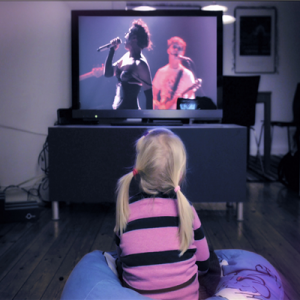It may come as a shock to many of the visitors to the SPOT festival this year but in a society that is considered one of the most egalitarian worldwide, gender equality in the music industry seems to have fallen decades behind. “It’s like knocking on a closed door”, says Maria Timm, musician. Nele Goutier tells about Ride The Balance: a documentary about Gender bias in the Danish music industry
Inside by Nele Goutier. Jutland Station.
A run-down wooden cabin, a ragged door, silence. Then, suddenly, an agonizing scream – five, ten seconds. A slightly nervous audience starts to shuffle on their seats. “Is this a human being or an animal being slaughtered?”, whispers my friend. Nothing is further away from the truth. The camera takes us inside and reveals the source of the penetrating sound. This is no crime scene or horror movie, this is Kvindebandet, a female Danish electro band, doing what they like most: experimenting with music.
The four members of Kvindebandet are an exception, because female musicians are a rarity in the Danish music scene. Roskilde Festival, one of the biggest music festivals in Europe, hosted only 15 female artists and 32 mixed bands in 2013 – the rest of the 170 performances were given by men. Of the members of the Danish copyright organization Koda 82% are men, receiving 88% of the funding. The gender bias shows in music academies too, where 90% of the teaching positions are taken by men. In a society that is considered one of the most egalitarian one’s worldwide, gender equality in the music industry seems to have fallen decades behind. “It’s like knocking on a closed door”, says Maria Timm, musician.
Taboo
The inequality issue is addressed in Ride The Balance, Astrid Dynesen’s first documentary that made its début at SPOT Festival on May 2nd and was followed by a panel discussion. Interviews with eight female professional musicians show that gender inequality is a topic that is preferably avoided. “The more people talk about gender, the more people will think being a woman it is all that we have”, explains Jenny Rossander, one of the interviewed musicians. The remarkable absence of male voices in the documentary points at an even stronger reluctance among men to talk about gender related issues.
“The more people talk about gender, the more people will think being a woman it is all that we have.”
Likewise, the interest in the documentary at SPOT was meagre. Whether it was indifference or the temptation of the sunshine that kept people away, the room at SPOT 2014 was only scarcely filled. Yet, Ride The Balance is worth watching; not only because of the freshness and relevance of the topic, but also because of the playful alternation between interviews and fragments of music videos, which gives the audience the chance to digest the given information and simultaneously enables a peek into the female music scene.
Catching up
The interviews with the professional musicians are alternated with shots of young girls leisurely making music on Pop Pilot, a music camp for girls exclusively. One of the attendants, a blond fifteen-year-old, tells the audience in a home-shot video about her passion for music. Such joy without pressure is exactly what is needed to enable girls to deliberate themselves from historical and cultural limitations, agree the interviewed professionals.
Yet, the discussion panel concludes that our aim should not be a 50/50 division in the music industry. What it is really about is freedom and equality in chances and choices. Currently, women may seem to be free, but emotional freedom is not a given, says Amanda Palmer, musician. She explains how seemingly free choices may be influenced by a dominant, male ideology, that tempts women to embrace nudity to increase their popularity. “If you are a powerful player in a fucked up system, is that really power? If you are making a free choice, but only because all the other choices are too scary, you are not free.”
“If you are a powerful player in a fucked up system, is that really power? If you are making a free choice, but only because all the other choices are too scary, you are not free.”
The women therefore agree: there might have been some gradual progress, but we are not there yet. If we try, changes may be seen in five or ten years, concludes the discussion panel, and the music industry may catch up with its egalitarian backlog.
The documentary ends with a close-up of the fifteen-year-old Pop Pilot attendant at a performance of Amanda Palmer; a dreamy smile of admiration on her face. This is where she wants to be. She has the current statistics against her, but if gradual changes continue – and that is what the interviewees want – they may become increasingly in her favor. Maria Timm, instructor at Pop Pilot: “We have got to try and see if you can make a change.”
Want to check out more music made by female artists? Take a look at the songs shown in Ride The Balance.
Nele Goutier is a Dutch journalist and is currently studying for her Erasmus Mundus Masters. She is also a senior editor at pan-European student site Pandeia.
This article was produced independently by Jutland Station.

